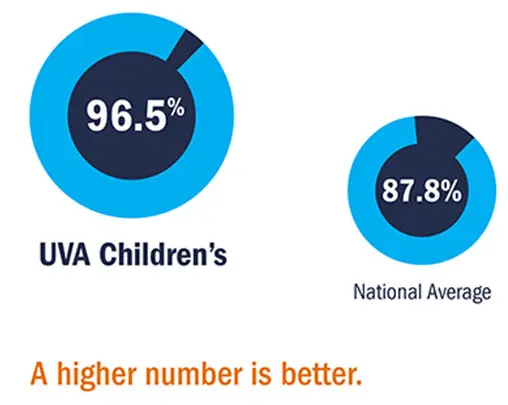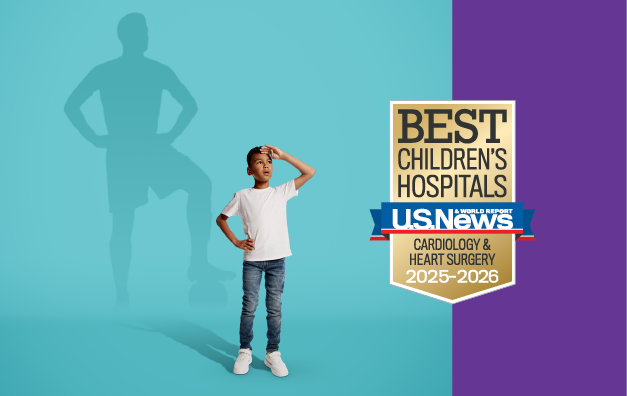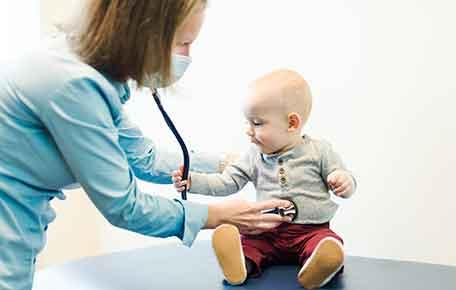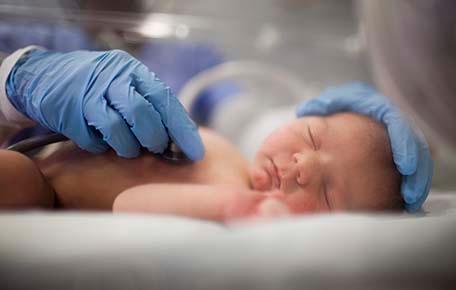Congenital Heart Defect Care

Make an Appointment
You’re looking forward to giving birth and meeting your new baby. Or you just welcomed your new child into the world. But you’ve also found out your baby has a congenital heart condition. You want to provide the best care available for your child.
UVA Health Children's has the largest newborn heart program in Virginia. We're also the only center in Virginia that can provide the full range of care that may be needed. Your baby's treatment will be provided by experts in CHD at the #1 children's hospital in Virginia
What Is a Congenital Heart Defect?
A congenital heart defect is any change in a baby's heart or blood vessels that occurs before birth. These conditions are more common than most people realize, affecting 1% of all births yearly. Some of these changes aren't harmful and just need to be monitored. But others will require immediate surgery.
When immediate surgery is needed, newborns stay in our nationally-ranked NICU. There, they'll receive the best care imaginable and continual monitoring to avoid complications.
For many procedures, we're also able to provide minimally invasive techniques. These reduce how much time is needed to heal, getting your family home faster.
Congenital Heart Defects We Treat:
We offer treatment for all congenital heart defects. From conditions that just need imaging and monitoring to major defects that require surgery immediately after birth.
Using fetal echo and advanced 3D modeling, we can often develop a treatment plan before a baby is even born.
Some of the conditions we treat include:
- Transposition of the Great Arteries
- Coarctation of the Aorta
- Double Aortic Arch
- Complete Heart Block
- Hypoplastic Left Heart Syndrome
- Hypoplastic Right Heart Syndrome
- Septal Defects
- Tetralogy of Fallot
- Total Anomalous Pulmonary Venous Return
- Truncus Arteriosus
- Epstein's Anomaly
Infant Heart Care at UVA Health Children's

When choosing your baby's care, you'll want to find experts you can trust. At UVA Health Children's, we have:
- Survival outcomes that go beyond the national and regional averages - see our outcomes data.
- New techniques not available everywhere.
- Compassionate, trained specialists with decades of experience.
- Advanced technology and tools, right-sized for the tiniest babies.
Care & Support for Life
As a patient at UVA Health Children's, your baby has a full team of specialists committed to their lifelong well-being.
This expertise stays with you through all stages of your child's care:
- During pregnancy - accurate diagnosis using fetal echo.
- At birth - nationally ranked care in our NICU.
- As your baby grows - integrated care from specialists and pediatricians, plus home monitoring.
- When your child grows up - lifetime care at our adult CHD Clinic.
If Your Baby Needs a Heart Transplant
Some conditions get to the point where your child needs a new heart. You're in good hands. We’re the only hospital in the state that offers pediatric heart transplants.
Better Care Closer to Home
At UVA Health Children's, we're partnering with Children's Hospital of The King's Daughters and Children's Hospital of Richmond at VCU to provide the best care for children needing heart surgery in central Virginia and beyond.
Congenital Heart Defect Care You Can Trust
At UVA Health Children's, we’re with you from diagnosis to care in our NICU and beyond. You won't find more support anywhere else.
Thomas L'Ecuyer, MD: UVA is the right place for families that have children with congenital heart disease, because of the quality of the team that takes care of these patients.
James Gangemi, MD: I think that, you know, from the time a pregnant mom gets referred to our pediatric cardiologists, from that first visit, they are part of our program and they feel like they are the only patient that is at this hospital.
Leslie Peregoy, MSN, PNP: I often meet the child and their family at the time of diagnosis, or shortly after. They are often very scared and worried. It's our goal to ensure that they know we are here for them.
Gangemi: Everybody takes care of the children as if he or she is their own child.
Jeffrey Vergales, MD: The vast majority of congenital heart disease in our current era is diagnosed by ultrasound. Sometimes that ultrasound is performed when the baby is still inside mom. At that point, we call that a fetal echocardiogram, and we can be very, very good about diagnosing the vast majority of congenital heart disease all the way down to around 18 to 20 weeks gestation.
L'Ecuyer: At UVA, we offer surgical treatment and catheter-based treatment of almost every single congenital heart defect.
Gangemi: Probably the most complex heart defect that we take care of are babies that are born with only one ventricle and they need a series of operations. They need multiple cardiac catheterizations, frequent follow-ups with our pediatric cardiologists, so, it definitely takes a team.
Peregoy: As far as the care of our patients with single ventricle physiology goes, we are part of a national group called the National Pediatric Cardiology Quality Improvement Collaborative.
Vergales: At UVA, we're very proud of our outcomes. Our outcomes exceed the national average for virtually all forms of congenital heart disease.
L'Ecuyer: And our outcomes are absolutely fabulous. And I think that should make it easier for a family to decide if UVA is the right place for them to receive care for their child.
Vergales: Parents should be empowered. They really should be empowered to ask their providers for that data. To ask for the providers to meet the people that are going to be in charge of ensuring that outcome. We on average have a length of stay that is almost half that of what the rest of the nation sees. That means that we're doing a great job of getting kids home and keeping them at home.
Gangemi: I honestly feel like I do not want a patient to leave this state to have surgery elsewhere, because they're not going to get any better care. They're not going to get better outcomes than if they're done right here.
Vergales: We realize that as a major referral center, we oftentimes have patients that come from hours and hours and hours away from Charlottesville. Consequently, we have numerous support structures that are in place. Our social work team is phenomenal here. We offer food daily in our hospital for families that are here, to make sure that they don't have to think about how are we going to eat today.
Gangemi: I am the luckiest person in the world to be able to do what I do because of the people that I work with. And it's not just the surgery, it's all aspects of the care of these patients. And everybody that we work with is made to feel like a valued member of the team.
Peregoy: I think there are lots of good parts of my job, but absolutely the best is being able to support a child and their family through some of the most difficult days that they could ever imagine.
Vergales: We will sit down with families as long as it takes. We will hold their hands, we will cry with them, we will hug them, we will do anything that they need to understand that they are engendering us with their most prized possession, their child.
L'Ecuyer: We need to assume that every child is uniquely important to their family, regardless of their degree of medical complexity, or other problems. And we need to recognize that what our goals for care for a particular situation might be, could very well be different than the parents. How well did we succeed in meeting and exceeding the parents' expectations.
Congenital Heart Defect Care

Nationally Ranked Heart Care for Children
UVA Health Children's cardiology and heart surgery program has been nationally ranked by U.S. News & World Report. Home to an experienced team of specialists, our cardiology program is able to deliver better outcomes on even the most complex pediatric heart conditions. World-class heart care, because your kids mean the world to us.
Additional Resources
- Comfort & PlayLearn About the Child Life program
The hospital can be an overwhelming and scary place to a little child. Our Child Life specialists use play to help your child understand and cope with treatment.
- What Happens Next?See Our Parent Guide
You have questions. You're facing so many unknowns. Get an overview of what to expect as you prepare for your child's heart surgery and beyond.
- Get SupportFind Support
You feel confident in your child's medical care. Now you have to figure out the details of where to stay and how to pay the bills. Find support for logistics and self-care.


